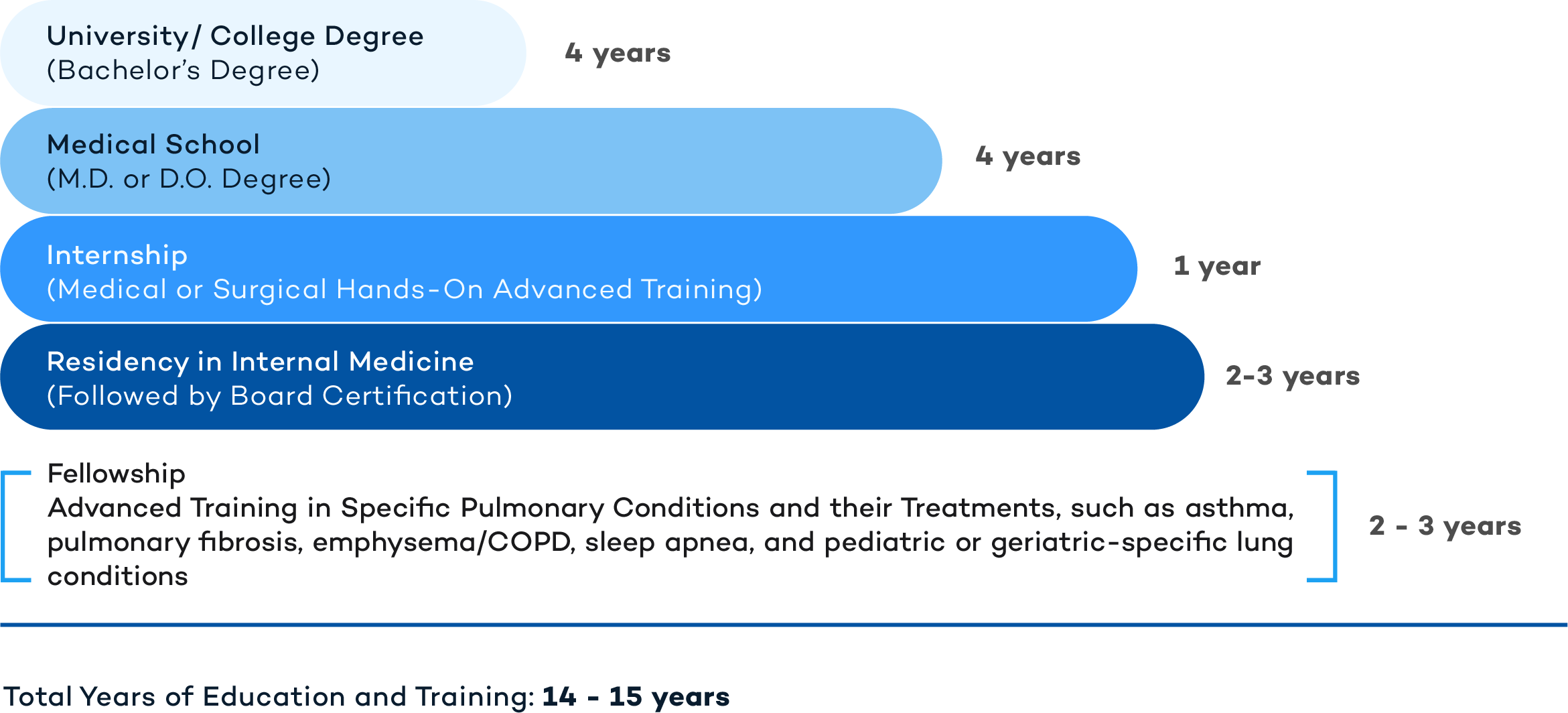

A Pulmonology is a Board-Certified Doctor that has been previously certified in Internal Medicine and specializes in treating and diagnosing diseases of the respiratory tract system focusing on organs included in the exchange of oxygen and carbon dioxide, including: nose, mouth, pharynx (throat), larynx (voice box), trachea (windpipe), bronchi (passage that conducts air into the lungs), bronchioles (site of oxygen and carbon dioxide exchange), alveoli (air sacs where gas exchange takes place), lungs and the respiratory muscles. A pulmonologist works with patients facing acute or chronic breathing problems and related sleep disorders.
When choosing a Pulmonologist, it is very important that you choose a physician that you can easily communicate with and trust, and who has the necessary credentials and expertise for your specific condition. Your primary physician (Internal Medicine or Family Medicine) or cardiologist can provide recommendations for a pulmonologist, but it is also important that you do your diligence to check the credentials and history of the doctor as well as patient reviews. myDoqter can help you do this by giving you access to other patients’ feedback about doctors, and you can also see the professional recommendations given by other physicians who have witnessed first-hand the expertise and professional competency of your doctor.
Pulmonologist are doctors (M.D. or D.O.) with advanced medical degrees and training. The following is a representation of the years of education and training that a pulmonologist has undergone.

PULMON from the Latin root ‘Pulmo’ for ‘Lung’ + LOGY from the Greek word ‘logia’ which means ‘logic’ or ‘the study of’.
A pulmonologist will treat an extensive list of respiratory-related conditions, including:
Asthma: A chronic long-term inflammatory disease that narrows airways of the lungs, hardening air movement in and out of your lungs.
Chronic Obstructive Pulmonary Disease (COPD): is a prolonged inflammatory lung disease that causes obstructed airflow from the lungs associated with chronic bronchitis and emphysema.
Influenza: Also known as “flu” is a respiratory illness that results from a viral infection.
Lung Cancer: A type of Cancer (abnormal, uncontrolled cell growth) that begins in the lungs.
Pneumonia: A common lung infection caused by bacteria, virus or fungi that creates swelling in air sacs in one or both lungs, which may fill with fluid or pus.
Pulmonary Fibrosis (PF): Disease that occurs when tissue becomes damaged and scarred in the lungs, and which can impair the ability to breathe.
Ultimately, prevention and good immune system health are the most important steps towards maintaining the health of your respiratory system. The American Lung Association recommends that you should look for a pulmonologist, in consultation with your primary physician, if a cough persists for more than 3 weeks, or if it becomes severe. When you visit your Pulmonologist, you will also receive important information regarding the prevention of respiratory and sleep-associated conditions. Important topics include:
Your pulmonologist may offer you different treatment choices for your condition and will work with you to find the best personal approach. Make sure to discuss all these options and other preventive recommendations with your doctor.
You can read more about the role of a Pulmonologist in the following links:
https://www.lung.org/about-us/blog/2019/05/know-your-providers-pulmonologist.html
https://www.thoracic.org/professionals/clinical-resources/disease-related-resources/index.php
https://www.lung.org/lung-health-and-diseases/
https://www.lung.org/lung-health-and-diseases/protecting-your-lungs/